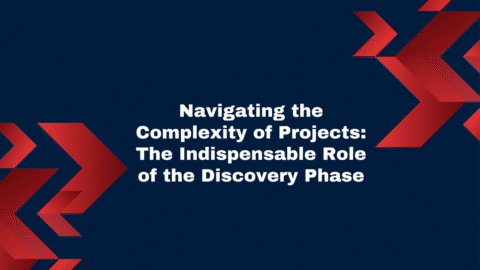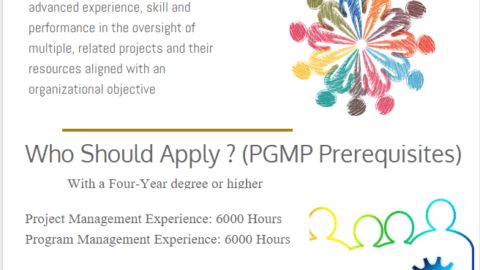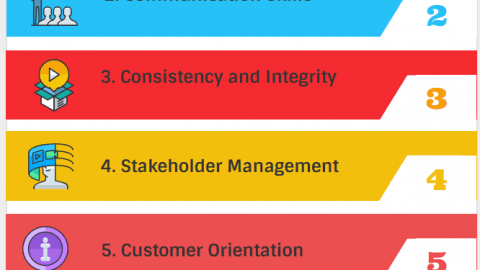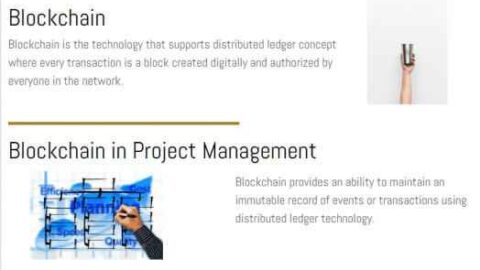100 WATERFALL PMP Questions and Answers – PDF Download [2024]
Are you gearing up for the Project Management Professional (PMP) exam? What do you know about pmp scenario based questions? Feeling a tad overwhelmed by the sheer volume of information you need to absorb? Well, fear not, because we’ve got you covered! In this comprehensive guide, we’ll delve into 100 WATERFALL PMP Questions and Answers that will help you ace the exam with confidence. So, grab your coffee, get comfy, and let’s dive right in!
Table of Contents
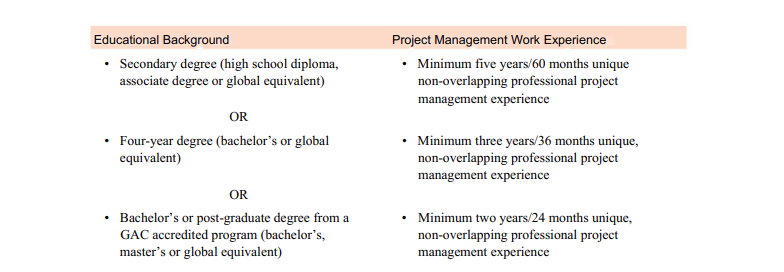
PMP Exam Requirements
Introduction
The Project Management Professional (PMP) certification stands as a gold standard for project management excellence, globally recognized for its rigor and the value it brings to professionals in the field. With project management methodologies evolving, the PMP exam ensures candidates are tested on various approaches, including traditional methods like the Waterfall model. This exam not only assesses a candidate’s knowledge and application of project management principles but also their ability to adapt to different project environments, making the preparation for this certification a rigorous process. Among the resources sought by aspirants are comprehensive question sets, such as “100 WATERFALL PMP Questions and Answers,” which serve as a vital tool for understanding the depth and application of the Waterfall methodology in project management. This focus on Waterfall questions is not accidental; it’s a reflection of the model’s enduring relevance in certain project contexts, despite the rise of agile methodologies.
Difficulty and Nature of Questions
- Is the PMP exam hard? Yes, many candidates find the PMP exam to be difficult. It requires a thorough understanding of project management practices as outlined in the PMBOK (Project Management Body of Knowledge) Guide and other resources. The exam tests not just your memory, but also your ability to apply knowledge in different scenarios.
- What kind of questions are asked in the PMP? The PMP exam consists of multiple-choice questions that cover the domains of project management: initiating, planning, executing, monitoring and controlling, and closing. The questions are designed to assess your understanding of project management principles and your ability to apply them in real-world scenarios.
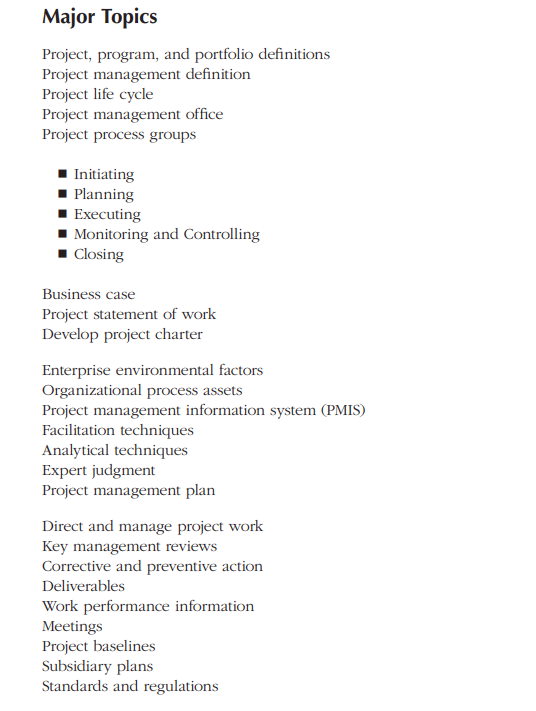
Major topics about PMP Exam
Exam Structure
- How many questions are there in the PMP exam? The PMP exam consists of 180 questions. Previously, it had 200 questions, but this was changed when the exam format was updated.
- How many questions are there in the PMP exam PDF? There isn’t a specific “PMP exam PDF,” but practice exams and study materials may vary in the number of questions they include. The official exam has 180 questions.
Study Materials and Preparation Time
- Is PMBOK 7 enough to pass the PMP? While the PMBOK Guide is a crucial resource, relying solely on it may not be sufficient. It’s recommended to use additional study materials, such as practice exams, study guides, and courses, to ensure a well-rounded preparation.
- Can I pass the PMP in one week? Can I pass the PMP in 3 weeks? Passing the PMP exam within one or three weeks depends on your prior experience, familiarity with project management concepts, and the amount of time you can dedicate to intensive study. It’s possible but challenging, especially for those new to project management.
- Can you self-study for the PMP? Yes, many candidates successfully prepare for the PMP exam through self-study, utilizing a combination of the PMBOK Guide, study guides, online courses, and practice exams.
Pass Rate and Exam Content
- What is the PMP pass rate? PMI does not officially publish the pass rate for the PMP exam. Estimates vary, but it’s commonly accepted that the exam has a rigorous standard.
- Is there math on the PMP exam? Yes, the exam includes questions that require basic mathematical calculations, such as earned value management (EVM), estimating costs, and determining schedules.
Speed of Preparation and Success Tips
- How quickly can I pass the PMP exam? The time it takes to prepare for and pass the PMP exam varies widely among individuals. A common recommendation is to spend between 1 to 3 months studying, with 1 to 2 hours per day if you are working full-time.
- What are the golden rules of PMP? While not officially designated as “golden rules,” successful candidates often emphasize the following strategies:
- Understand the PMBOK Guide thoroughly.
- Practice with as many mock exams as possible to familiarize yourself with the exam format and question types.
- Study regularly and consistently, breaking down the material into manageable sections.
- Join a study group or find a study partner to discuss and reinforce learning.
- Focus on understanding concepts rather than memorizing facts, especially since the exam tests your ability to apply knowledge in practical scenarios.
Section 1: Understanding the Waterfall Methodology
The Waterfall model, with its sequential and linear approach to project management, provides a structured framework that many find invaluable for projects where requirements are well understood from the outset. Its stages—conception, initiation, analysis, design, construction, testing, implementation, and maintenance—lay a clear path that simplifies complex project tasks. This clarity and predictability make the Waterfall model a staple in fields like construction and software development, where changes late in the project can be prohibitively expensive or even impossible. For PMP exam takers, mastering the Waterfall methodology is not just about memorizing steps; it’s about understanding how each phase interacts with the others, the importance of documentation, and the reasons behind the model’s disciplined approach to project management.
Incorporating Waterfall methodology into the PMP Exam reflects the PMI’s (Project Management Institute) recognition of the model’s value in certain project scenarios. As such, the exam covers not only the theory behind Waterfall but also its practical application, including pmp scenario based questions that test a candidate’s ability to apply Waterfall principles to real-world situations. This approach ensures that certified professionals are not only familiar with a variety of methodologies but are also adaptable, able to choose and apply the most appropriate PMP scenario based questions on the project’s specific needs.
The “100 WATERFALL PMP Questions and Answers” are thus designed to provide candidates with a thorough understanding of the Waterfall model as it applies to the PMP exam. These questions cover a wide range of topics, from the basics of each phase to more complex concepts related to risk management, quality control, and integration with other methodologies.
Facts About the PMP Exam:
- Global Recognition: The PMP certification holds immense value worldwide, serving as a testament to an individual’s expertise and proficiency in project management practices. Whether you’re based in North America, Europe, Asia, or any other continent, the PMP designation carries significant weight among employers, clients, and peers.
- Stringent Requirements: To be eligible for the PMP exam, candidates must meet specific educational and professional experience criteria outlined by the PMI. This ensures that individuals seeking PMP certification possess a solid foundation of project management knowledge and practical experience before undertaking the rigorous examination process.
- Comprehensive Coverage: The PMP exam encompasses a broad spectrum of project management topics, ranging from project initiation and planning to execution, monitoring, control, and closure. This comprehensive coverage reflects the multifaceted nature of project management and the diverse skills required to excel in this field.
Preparing for the PMP Exam
Preparing for the PMP Exam requires a strategic approach, especially when focusing on specific methodologies like Waterfall. Candidates must navigate through vast syllabi, integrating both theoretical knowledge and practical applications. Given the exam’s comprehensive nature, delving into “100 WATERFALL PMP Questions and Answers” can significantly bolster a candidate’s readiness, offering insights into the types of questions they might face and the depth of understanding required. This preparation phase is crucial for mastering the Waterfall model, as it involves not just memorization, but a deep comprehension of how and when to apply this methodology in real-world project scenarios.
Resources for finding these Waterfall-focused questions are abundant, ranging from PMI’s own materials to third-party educational platforms. It’s essential for candidates to choose resources that are not only reputable but also align with the latest exam content outline. Engaging with study groups and forums can provide additional insights and tips from peers and professionals who have successfully navigated the exam. Furthermore, practice exams, especially those dedicated to Waterfall methodology, can help candidates identify their strengths and weaknesses, allowing them to focus their study efforts more effectively.
100 WATERFALL PMP Questions and Answers [Download PDF]
In today’s rapidly evolving project management landscape, preparing for the PMP (Project Management Professional) exam requires access to the best resources. One of the most effective ways to ensure you have the information you need is to download PDF materials that cover the breadth of the exam content. These documents often include study guides, practice questions, and summaries of key concepts.
2020_PMP-Prep-Exam-Test-200_Questions.pdf
To begin your journey towards PMP certification, it’s advisable to download PDF versions of the PMBOK (Project Management Body of Knowledge) guide. This comprehensive guide is an essential resource for understanding the methodologies, practices, and terminologies that will be tested on the exam. Additionally, numerous download PDF resources are available online, offering condensed study materials and tips to help you grasp complex topics more quickly.

Sample PMP Question
Practice exams are another critical tool in your study arsenal. You can download PDF files containing sample questions that mirror those on the actual exam. Taking these practice tests can help identify your strengths and weaknesses, allowing you to focus your study efforts more effectively.
Finally, don’t overlook the value of download PDF cheat sheets and quick reference guides. These resources provide a concise overview of formulas, processes, and key points that are crucial for the exam. Having them readily available can significantly enhance your study sessions.
Remember, success in the PMP exam comes from thorough preparation and utilizing a variety of study materials. Make sure to download PDF documents and integrate them into your study plan for an efficient and comprehensive review.

Sample PMP Question
PMP scenario based questions
In preparing for the PMP exam, understanding how to approach PMP scenario based questions is crucial for success. These types of questions are designed to assess your practical knowledge and ability to apply project management principles in real-world situations. When tackling PMP scenario based questions, it’s important to carefully read each scenario, identifying key elements such as the project goals, constraints, stakeholder expectations, and any given data related to the project’s scope, budget, or schedule.
To effectively answer PMP scenario based questions, you should apply the PMBOK Guide’s processes and knowledge areas to the scenario presented. This involves analyzing the situation, applying relevant project management theories, and choosing the best course of action among the options provided. Remember, PMP scenario based questions are not just about testing your memory; they’re about evaluating your ability to think critically and make informed decisions in complex project situations.
Finally, when practicing PMP scenario based questions, it’s beneficial to review why certain answers are correct and why others are not. This approach helps deepen your understanding of project management principles and prepares you for the variety of scenarios you might face in the actual PMP exam.
Tips for Maintaining PMP Certification
Maintaining your PMP certification is as crucial as earning it. The Project Management Institute (PMI) requires certified professionals to engage in continuous professional development to keep their certification active. Here are some tips to help you maintain your PMP certification:
- Understand the Continuing Certification Requirements (CCR): PMI requires PMP holders to earn 60 Professional Development Units (PDUs) every three years to maintain their certification. PDUs can be earned through professional experience, education, giving back to the profession, and self-directed learning.
- Engage in Professional Development: Enroll in workshops, seminars, webinars, and other educational programs related to project management. These not only provide valuable knowledge and insights but also contribute PDUs towards your certification maintenance.
- Stay Active in the Project Management Community: Participating in project management forums, local PMI chapter meetings, and conferences can not only earn you PDUs but also keep you connected with industry trends and networking opportunities.
- Contribute to the Profession: Sharing your knowledge and skills by teaching, mentoring, or volunteering in project management-related activities not only benefits the community but also earns you PDUs.
- Record and Report PDUs Promptly: Keep a detailed record of your PDUs and report them to PMI through their online Continuing Certification Requirements System. Staying organized will help you manage your PDUs efficiently over the three-year cycle.
- Plan Your PDU Earning Activities: Strategically plan your activities to earn PDUs across the various categories defined by PMI. This ensures a balanced approach to professional development and allows you to explore different areas of interest within project management.
- Stay Informed: Regularly check the PMI website for updates on certification policies and professional development opportunities. PMI occasionally updates its certification requirements and provides new resources for earning PDUs.
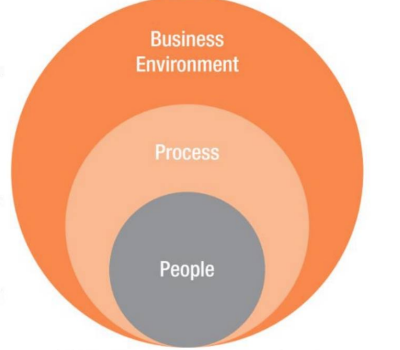
All domains: people and
processes exist within the business environment
Detailed Insights into “100 WATERFALL PMP Questions and Answers”
The “100 WATERFALL PMP Questions and Answers” serve as a cornerstone for candidates aiming to excel in the Waterfall portions of the PMP Exam. This collection is meticulously designed to cover every facet of the Waterfall methodology, from the initial project conception through to maintenance. The pmp scenario based questions are crafted to challenge candidates’ understanding of Waterfall’s sequential nature, emphasizing the importance of detailed planning, comprehensive documentation, and rigorous phase completion before moving on to the next step.
These questions do more than just test knowledge; they immerse candidates in the Waterfall mindset, requiring them to think critically about how they would apply the methodology in various project scenarios. For example, a question might present a scenario where project requirements change unexpectedly after the design phase is complete. Candidates would need to demonstrate their understanding of how the Waterfall model handles such changes, highlighting the methodology’s strengths and limitations. Through this deep dive, candidates gain a nuanced understanding of Waterfall, equipping them with the ability to decide when it’s the best approach for a project and how to implement it effectively.
Strategies for Answering Waterfall Questions
Successfully answering Waterfall questions in the PMP Exam hinges on a candidate’s ability to apply theoretical knowledge to practical situations. Strategies for tackling these questions include understanding the core principles of the Waterfall methodology, such as its linear and sequential process flow, and recognizing the critical importance of each phase in the project lifecycle. Candidates should practice applying these principles to various scenarios, considering factors like project size, complexity, and stakeholder expectations.
Time management is another crucial strategy during the exam. Waterfall questions, with their emphasis on process and documentation, can be time-consuming. Candidates should practice answering these questions under timed conditions to develop a sense of how much time to allocate to each question. Additionally, developing a systematic approach to reading and understanding questions can help candidates quickly identify the key issues and the most appropriate Waterfall principles to apply.
Lastly, candidates should be prepared to explain their reasoning for choosing a particular course of action in a given scenario. The PMP Exam often tests not just what candidates would do, but why they would do it, requiring a deep understanding of Waterfall principles and their application. This understanding allows candidates to demonstrate not just knowledge, but also critical thinking and decision-making skills—qualities essential for any project manager.
Hello, I’m Cansu, a professional dedicated to creating Excel tutorials, specifically catering to the needs of B2B professionals. With a passion for data analysis and a deep understanding of Microsoft Excel, I have built a reputation for providing comprehensive and user-friendly tutorials that empower businesses to harness the full potential of this powerful software.
I have always been fascinated by the intricate world of numbers and the ability of Excel to transform raw data into meaningful insights. Throughout my career, I have honed my data manipulation, visualization, and automation skills, enabling me to streamline complex processes and drive efficiency in various industries.
As a B2B specialist, I recognize the unique challenges that professionals face when managing and analyzing large volumes of data. With this understanding, I create tutorials tailored to businesses’ specific needs, offering practical solutions to enhance productivity, improve decision-making, and optimize workflows.
My tutorials cover various topics, including advanced formulas and functions, data modeling, pivot tables, macros, and data visualization techniques. I strive to explain complex concepts in a clear and accessible manner, ensuring that even those with limited Excel experience can grasp the concepts and apply them effectively in their work.
In addition to my tutorial work, I actively engage with the Excel community through workshops, webinars, and online forums. I believe in the power of knowledge sharing and collaborative learning, and I am committed to helping professionals unlock their full potential by mastering Excel.
With a strong track record of success and a growing community of satisfied learners, I continue to expand my repertoire of Excel tutorials, keeping up with the latest advancements and features in the software. I aim to empower businesses with the skills and tools they need to thrive in today’s data-driven world.
Suppose you are a B2B professional looking to enhance your Excel skills or a business seeking to improve data management practices. In that case, I invite you to join me on this journey of exploration and mastery. Let’s unlock the true potential of Excel together!
https://www.linkedin.com/in/cansuaydinim/

![100 WATERFALL PMP Questions and Answers - PDF Download [2024]](https://www.projectcubicle.com/wp-content/uploads/2024/02/100-WATERFALL-PMP-Questions-and-Answers-PDF-Download-2024-1038x584.png)
